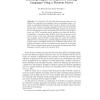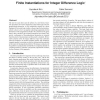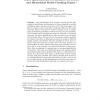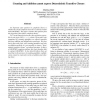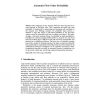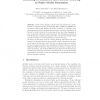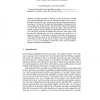FOIKS
2006
Springer
14 years 3 months ago
2006
Springer
It is claimed in [45] that first-order theorem provers are not efficient for reasoning with ontologies based on description logics compared to specialised description logic reasone...
FMCAD
2006
Springer
14 years 3 months ago
2006
Springer
The last few years have seen the advent of a new breed of decision procedures for various fragments of first-order logic based on ional abstraction. A lazy satisfiability checker ...
CSL
2006
Springer
14 years 3 months ago
2006
Springer
Game quantification is an expressive concept and has been studied in model theory and descriptive set theory, especially in relation to infinitary logics. Automatic structures on t...
CDB
2004
Springer
14 years 3 months ago
2004
Springer
Abstract. Constraint databases that can be described by boolean combinations of polynomial inequalities over the reals have received ample research attention. In particular, the ex...
LICS
1999
IEEE
14 years 3 months ago
1999
IEEE
An important open question in complexity theory is whether the circuit complexity class TC0 is (strictly) weaker than LOGSPACE. This paper considers this question from the viewpoi...
KBSE
1999
IEEE
14 years 3 months ago
1999
IEEE
Many domain specialists are not familiar or comfortable with formal notations and formal tools like theorem provers or model generators. To address this problem we developed Attem...
SIGSOFT
2000
ACM
14 years 3 months ago
2000
ACM
An automatic analysis method for first-order logic with sets and relations is described. A first-order formula is translated to a quantifier-free boolean formula, which has a mode...
SEMWEB
2009
Springer
14 years 6 months ago
2009
Springer
Most languages for the Semantic Web have their logical basis in some fragment of first-order logic. Thus, integrating first-order logic with probability is fundamental for represen...
CADE
2002
Springer
14 years 12 months ago
2002
Springer
Abstract. Finite model search for first-order logic theories is complementary to theorem proving. Systems like Falcon, SEM and FMSET use the known LNH (Least Number Heuristic) heur...
CADE
2003
Springer
14 years 12 months ago
2003
Springer
The DPLL procedure is the basis of some of the most successful propositional satisfiability solvers to date. Although originally devised as a proofprocedure for first-order logic, ...
